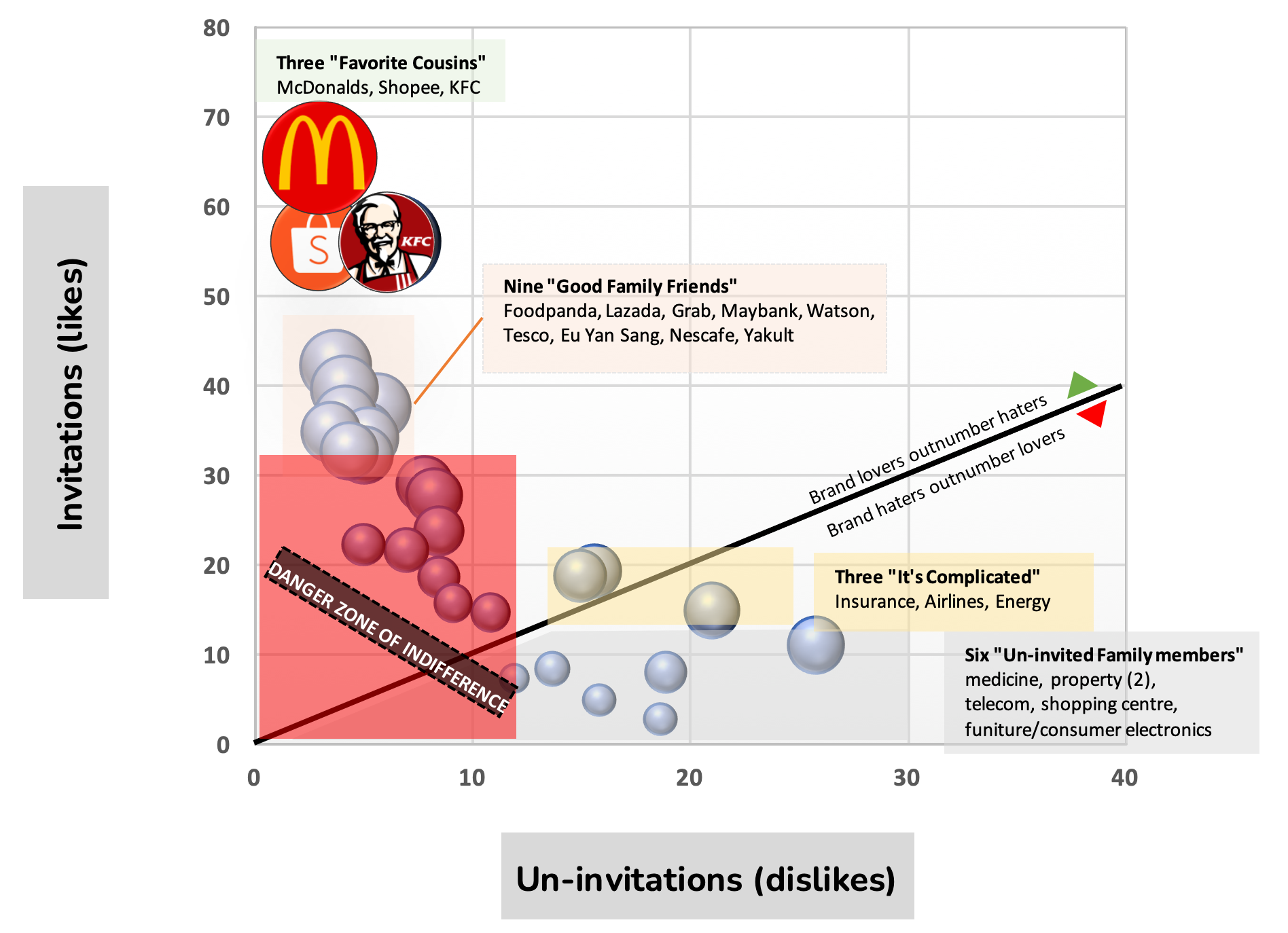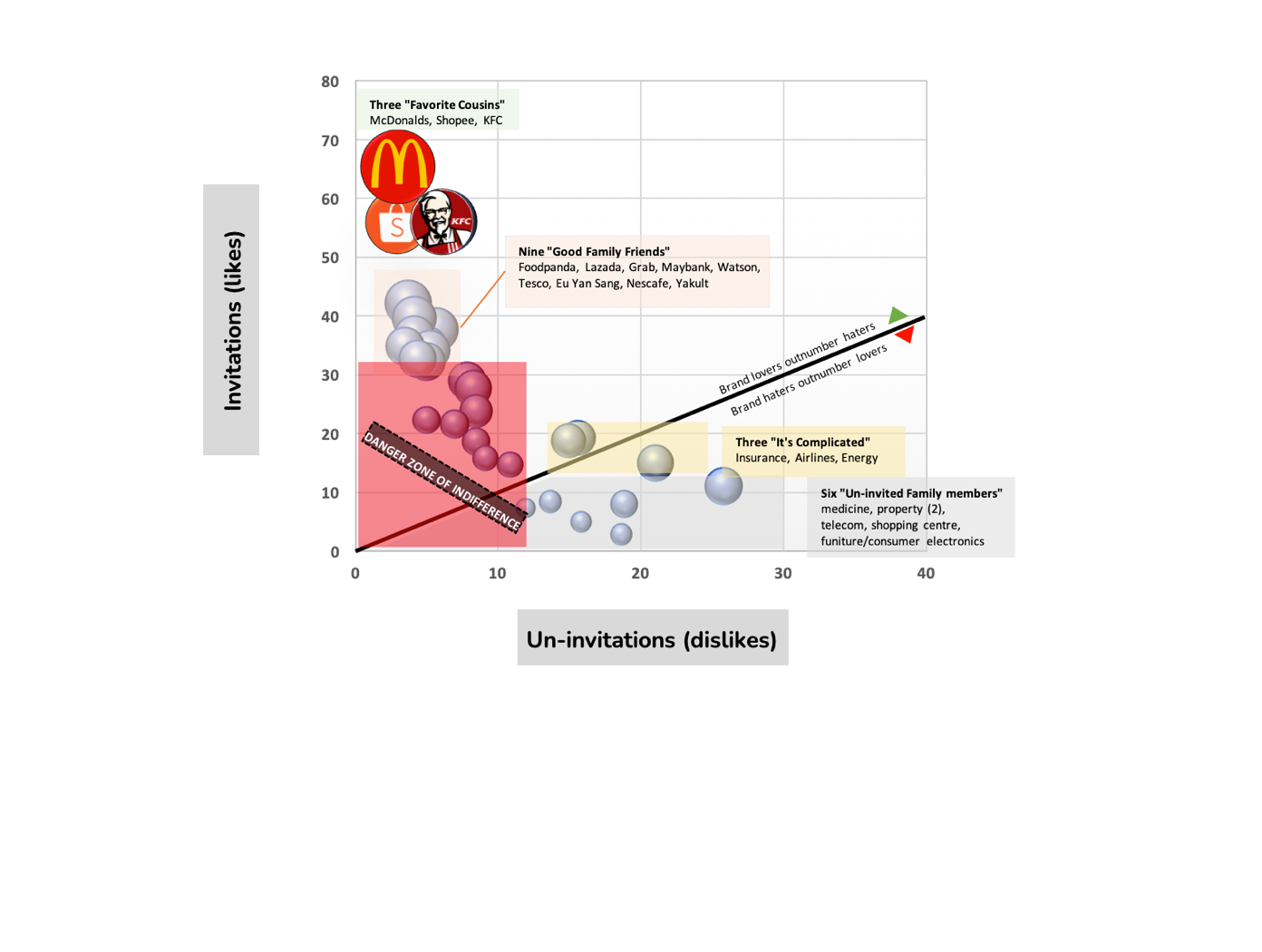During this extraordinary pandemic-struck Chinese New Year, many families were not able to completely reunite. As a result, the wish to be together became even stronger than ever. Many brands wanted to resonate with these sentiments people had, and as such their CNY ads showed us how it is to celebrate together and remind us of a good time with all our family together. These memories and brand stories were massively published and shared on our social media news walls, stories, and of course through traditional media channels like TV commercials.
All the more these commercials were instrumental in promoting the CNY celebrative spirit. It looked as if the brands were inviting us to their own CNY open houses.
Asia School of Business and market research company Vase.ai were curious to see whether people would think of offering a counter-invitation: are brands, if they were persons, invited to join our CNY open house celebrations?
To check this well, we conducted a large-scale study among 462 Ethnic-Chinese Malaysians. Our study presented this representative sample to a choice of 29 brands that had heavily advertised during the last month of CNY.
Our two questions were:
“If these brands were persons, which brands would be invited to your CNY open house? And which ones won’t be?

As a note aside, asking people to think of brands as persons is a very common practice. In daily life, consumers tend to attribute human features to brands. Many of us project certain personality characteristics on the brands they know and like. For example, for many people the car brand Volvo has a responsible, trustworthy, reliable, family-man personality.
1. The Twelve Invited brands:
Our study shows that on average, a brand receives an CNY open house invitation from 27% Chinese Malaysian consumers. Some brands are more welcome than others.
Most Invited Brands - McDonalds, KFC and Shopee
Clearly, three brands – McDonalds, KFC and Shopee – are the most wanted guest at CNY open houses. As the nation’s favorite cousins, they won over a 50% popularity vote.

Followed by 9 Invited Brands
They are followed by nine brands getting invitations from 30% or more from the people, but not a majority. These “good family friends” are Foodpanda, Lazada, Grab, Maybank, Watson, Tesco, Eu Yan Sang, Nescafe, and Yakult.

Figure 1: The 5 Family Groups of CNY-Brands

Figure 1 plots the popularity of the brands against their unpopularity. The vertical Y-axis indicates the percentage of Invitations (“likes”) a brand had received, whereas the horizontal X-axis shows the number of un-invitations (“dislikes”) a brand received, not to join the CNY celebrations.
2. The Nine Un-invited brands
Six of the 29 brands included in the study received many more non-invites, than invitations. As it is not very polite to publicly announce which brands are unpopular and/or unwelcome, we will only mention their industries. For one of them, the reason is obvious: it is a strong-branded medicine, and it is generally considered inauspicious to welcome medication to a CNY open house. It may introduce bad luck.
A fourth group consists of three brands with a certain “double-bind.” The relationship is a mix of positivity and negativity. For instance, people have with an insurance company, an airline, and an energy company; for them, basically, it is not clear if the brands are welcome or not. In a relational sense, “it’s complicated” as the number of CNY open house invitations is as large as the number of non-invites.
3. The Eight Brands in the “Danger Zone of Indifference”
Finally, this study identifies a fifth group of brands. Those are the ones people don’t really care about. There is no significantly strong affection, and they are not even important enough to be disliked.
In our study, there are eight brands we neither like nor dislike.
This category in the “Zone of indifference” is a nightmare scenario for the marketer, as there is no existing cloud to start your conversation and sharpen the positioning.
It means all the way back to the drawing board: thinking of the ideal target audience and crafting a better value proposition. It means for them, being below the radar of most people, this new year had an even worse start. Being in the Zone of Indifference is by no means comforting. It means hard work – if not the end is near and it might well be unlikely to be part of the CNY celebrations in 2022.
With that, we wish all brands Happy Chinese New Year and May You Stay Out of the Danger Zone of Indifference.
By Willem Smit and Julie Ng
Prof. Willem Smit is the Assistant Professor of Marketing at Asia School of Business and International Faculty Fellow at MIT Sloan.
About Asia School of Business
Asia School of Business (ASB) was established in 2015 by Bank Negara Malaysia in collaboration with MIT Sloan School of Management to be a premier global business school, a knowledge and learning hub infused with regional expertise, insights and perspectives of Asia and the emerging economies.
ASB’s executive education programs and degree programs have been globally-acclaimed for leading the way in management education. Through its award-winning Action Learning based curriculum, in partnership with the corporate community and students from across the world, ASB is committed to developing transformative and principled leaders who will contribute towards advancing the emerging world.
About Vase.ai
Vase.ai is a market research technology firm specialising in online consumer research to help consumer brands make decisions that drive higher ROI. With an emphasis on speed and accuracy, our flagship software product, allows you to seek consumer opinions from over 400,000 Malaysians and gain results in under 2 hours. Whether you're a novice or an expert researcher, Vase can help you make better, faster and more informed data-driven decisions.
--
If you want to know how your brand is being perceived in the eyes of your target consumers, check out our brand audit page to find out how we can help.







